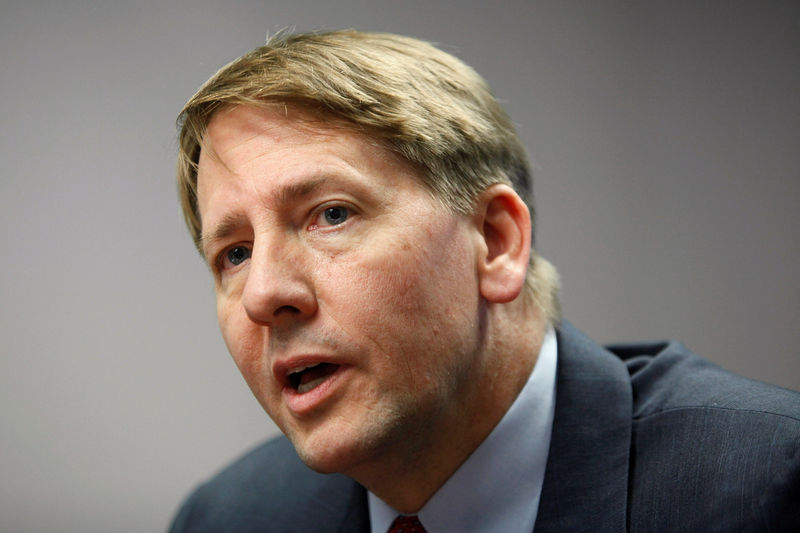By Lisa Lambert
WASHINGTON (Reuters) - The U.S. Consumer Financial Protection Bureau, already in legal limbo after an October court decision, could find its powers scaled back by President-elect Donald Trump and a Republican-led Congress, according to members of both political parties, lobbyists and lawyers.
That may mean the end of many of the agency's rule-making actions that have enraged critics, including a proposal to stop companies from blocking customers from class action lawsuits and another one to limit payday lending.
Creation of the CFPB was authorized in the 2010 Dodd-Frank Wall Street reform law enacted in the aftermath of the 2007-09 financial crisis. The agency began operations in 2011.
An agency to protect consumers' finances was the idea of liberal Democratic Senator Elizabeth Warren of Massachusetts. Its creation is considered one of Democratic President Barack Obama's top domestic policy achievements.
A Trump administration is expected to be hostile to the agency as it is currently formulated.
"The election spells very bad news for the CFPB," said Alan Kaplinsky, head of the Consumer Financial Services Group at law firm Ballard Spahr.
Many Republicans opposed the agency's creation. They now say they dislike its structure and believe it oversteps its authority in enforcement.
"It's a very fragile thing. It was birthed in controversy and is under constant attack," said consumer attorney Deepak Gupta, who worked at the CFPB in its early days. "It may not survive the way we know it through this administration."
A single director leads both rule-making and enforcement, and can be dismissed only for cause. Furthermore, the agency is funded by the U.S. Federal Reserve system, which means it is not dependent on the typical congressional appropriations process.
The Republican-led House of Representatives Financial Services Committee in September passed legislation without any Democratic votes that would change the name and structure of the agency and would create a five-member commission to govern it.
Republicans also have pushed for the agency to receive funds from Congress to make it accountable to elected leaders.
Both of those proposals would greatly weaken the power of Richard Cordray, the agency's original and current director.
Obama has blocked these Republican efforts with veto threats.
Trump, though he has not directly addressed the CFPB, has said he wants to roll back parts of Dodd-Frank. Trump could, if he wanted to, fire Cordray on the first day of his presidency, especially following an October ruling by a three-judge federal appeals court panel that found the agency's structure unconstitutional and that the president should be able to dismiss the director at will.
That ruling was put on hold while the CFPB decides whether to petition the entire U.S. Court of Appeals for the District of Columbia Circuit for a review or appeal the ruling to the U.S. Supreme Court. The agency has until Nov. 25 to decide. Trump's administration could withdraw any appeal, letting the decision stand.
Cordray, appointed in 2013, is halfway through his five-year term.
Few in the banking industry think the entire agency will be eliminated. Democrats who support the agency will have a large presence in the Senate. Warren, who was Obama's first choice to head the agency, has promised that Democrats will fight efforts to defang it.
Even some bankers want to see it stay. Richard Hunt, president of the Consumer Bankers Association, said his group would fight to maintain the CFPB in some form because it consolidates consumer banking rules under one regulator.
A DIFFERENT DIRECTOR
Trump takes office on Jan. 20. Cordray could be replaced early in 2017, said Mark Calabria, an economist at the libertarian Cato Institute think tank. Trump's transition team is already looking into Cordray replacements, he said.
The law allows for the president to terminate a director over inefficiency, malfeasance or neglect of duty, which leaves room for Trump to find cause regardless of what the appeals court decides, Calabria added.
Cordray has set precedent with enforcement cases that Calabria and other critics have called backdoor rule-making.
"Cordray has left the CFPB vulnerable to what his successor may want done because he didn't hardwire rule-making," Calabria said.
If Cordray quits or is removed, statute calls for his deputy to step into the job temporarily. Acting Deputy Director David Silberman, also a strong consumer advocate, would likely continue to carry out the current agenda, said Quyen Truong, a partner at Washington law firm Stroock & Stroock & Lavan. Truong was the assistant director and deputy general counsel for the CFPB until earlier this year.
The CFPB did not respond to requests for comment on Cordray's possible departure or the fate of current rule-making actions.
